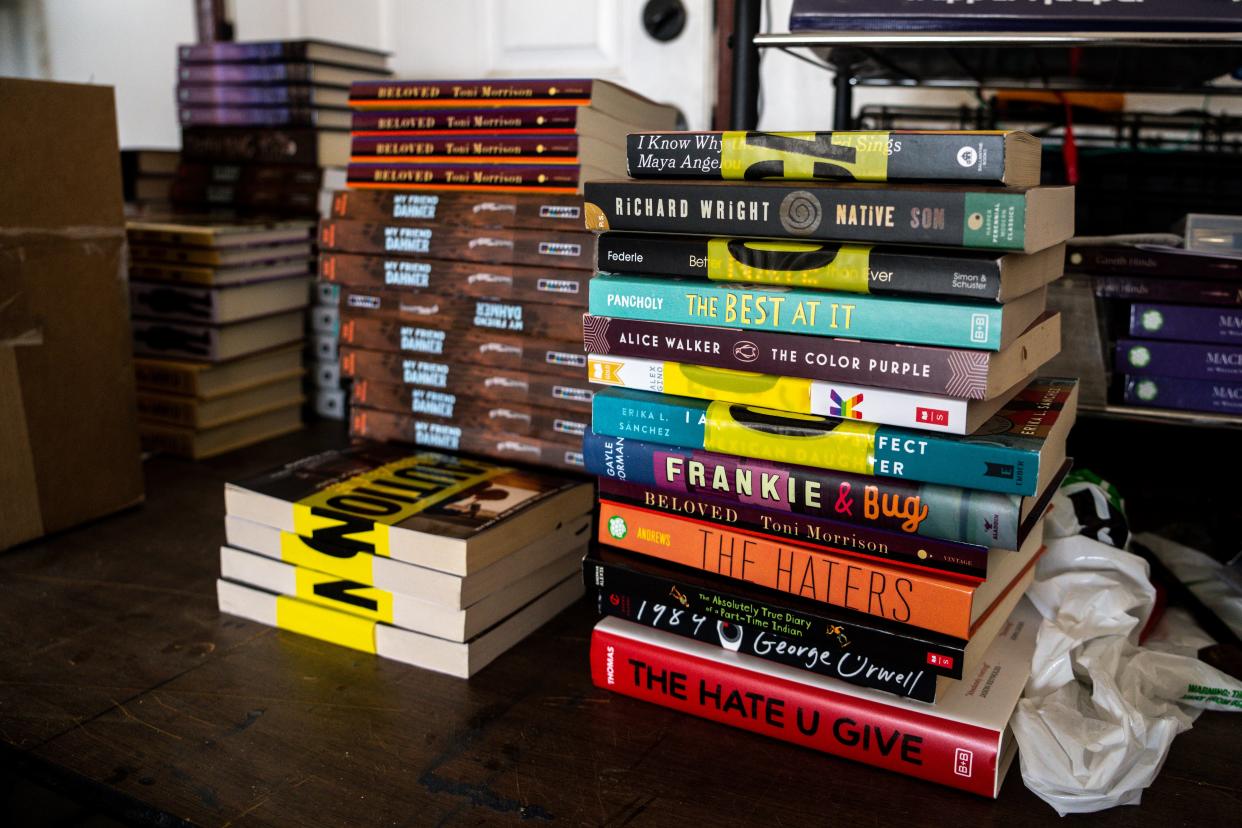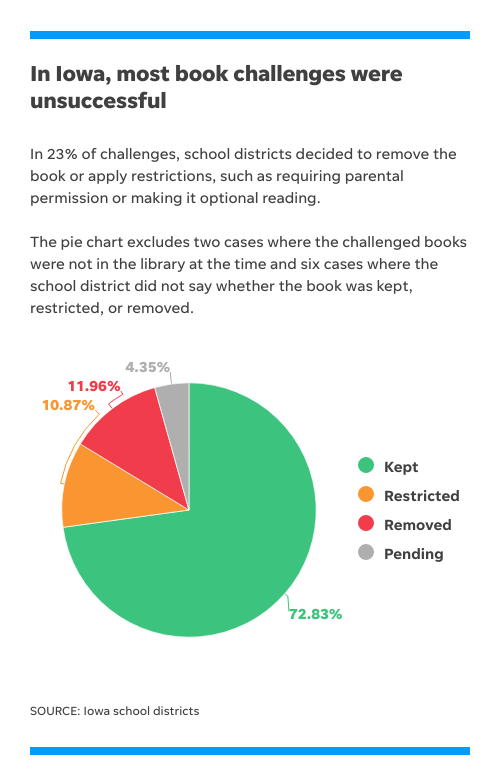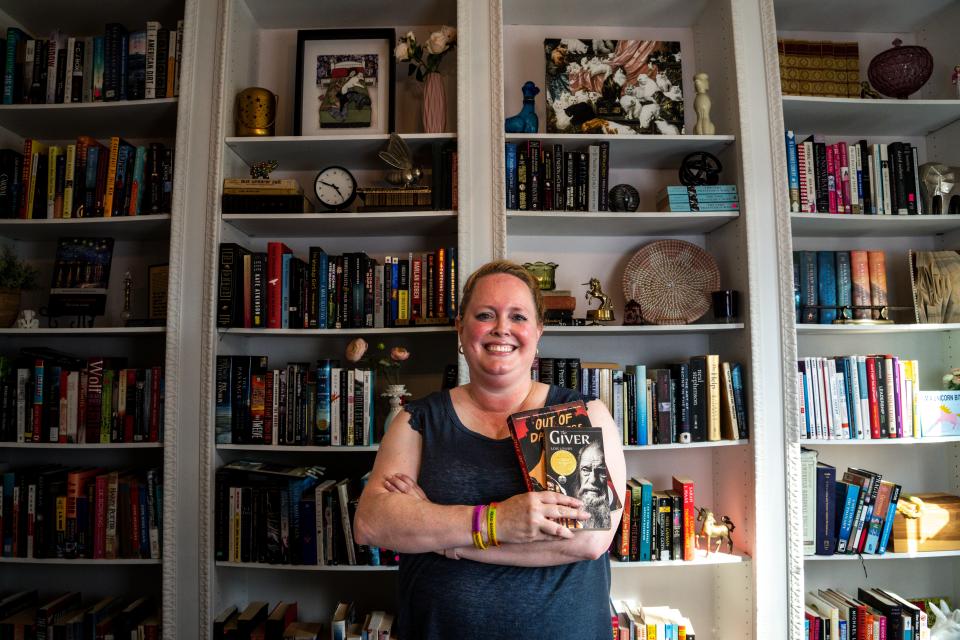Book bans: In 3 years, 60 texts have been challenged in Iowa schools. A new law could ban more.

Kyle Baxter didn't want "The Hate U Give," the novel about a 16-year-old who witnessed a white police officer kill her friend, to be required reading for Perry (Iowa) High School students.
Baxter’s daughter had brought home a note in August 2022 that said her sophomore class would be reading Angie Thomas' controversial book. Baxter was uneasy about the book's portrayal of race, police brutality and social injustice. He also believed it normalized rioting, teen drug use and sex.
“The way things are depicted in the book is not what we expect our kids to act like,” said Baxter, a former longtime Perry School Board member. “It was pushed on as a required read for every sophomore, and I didn't feel that every kid needed to read it.”
So, he challenged the book’s use as required reading, using the Perry Community School District’s reconsideration process. Ultimately, he lost — the district decided to keep the book as part of the curriculum.
As Baxter challenged “The Hate U Give” in Perry, schools around Iowa were caught up in similar disputes over what books students should — or shouldn't — be able to access.
Related: Why Iowa's ban on books with sex could sink libraries shared by schools and small towns
Conservative activists and Republican politicians have condemned books featuring the LGBTQ community and social justice issues as "age inappropriate." They say the books are obscene or push a political agenda.
A handful of parents, caregivers and members of the conservative group Moms for Liberty began filing book challenges and speaking out. Soon, the debate moved to the Iowa Legislature.
It culminated last spring with Republicans passing a law they said would give parents more control over their children's education. The law bans virtually all books depicting sex.
The Des Moines Register, part of the USA TODAY Network, undertook a months-long investigation to gauge how widespread community concerns about books were in Iowa schools before the Legislature acted. The findings: Book challenges in Iowa have been rare the past three years.
Nearly 90% of Iowa's 327 school districts did not have a single challenge from August 2020 to May 2023, according to the database that the newsroom compiled of challenges for every district in the state.
Parents, caregivers and community members filed just 100 complaints involving 60 books and one film over that three-year period. In 23% of those challenges, school districts decided to remove the book or apply restrictions, such as requiring parental permission or making it optional reading.
Margaret Buckton, a lobbyist for the Urban Education Network of Iowa and the Rural School Advocates of Iowa, said the results show Iowa's lawmakers focused on something that was not a significant problem in the first place.
“It shows that there was a process in place that communities talked about their concerns with their school boards,” Buckton said, “and sometimes districts reacted based on what they discovered in that process. So, I would have said that process was working.”
What Iowa's new law requires
Senate File 496, the new education law, carries sweeping new obligations for all Iowa schools.
It requires school officials to proactively remove books from classrooms and libraries that are not "age appropriate" because they depict sex acts.
It also prohibits instruction on gender identity and sexual orientation through sixth grade, which some districts have interpreted as also banning books that address those subjects.
Opponents say protocols for challenging materials already existed, and the new law opens the door to censorship, potentially triggering the removal of far more books from schools and the erasure of stories about marginalized communities.
“The (challenge) process is a lot of work, and I do think that serves as a deterrent. And that’s good,” said Sara Hayden Parris, founder of Annie’s Foundation, a nonprofit that opposes book removals. “If I feel that strongly about banning a book, I should want to do my homework and my research. It should be something I gladly do.”
But Republicans said they heard from Iowans that the existing reconsideration process, used to ask a school district to remove or restrict a book, is difficult to navigate. While the new law does not change that process, it could exponentially expand the number of books that schools will be obligated to remove.
“From what I hear from parents and other people in districts is that the process has been horrible,” said Rep. Helena Hayes, R-New Sharon. “It has been difficult and disappointing. And they would love to see something done differently.”
Nearly 90% of Iowa districts have had no recent book disputes
Under Iowa law, parents and community members can challenge books that are assigned or available in schools. Each school district has a review process to determine if a challenged book is appropriate or has educational value and will remain on the shelf or be removed.
The Register asked all 327 public school districts how many book challenges they've had and which books were targeted in the past three years.
Thirty-six saw at least one book challenged — about 11% of the districts in the state — led by Oskaloosa with 16 challenges and Carroll with 11.
A small set of parents or community members there filed most of the complaints, at three or more apiece.

The 291 other districts said they had no challenges.
As challenges became public, some were contentious, drawing crowds of irate students, teachers and parents to school board meetings.
Not every challenged book caused a stir. Mount Vernon Community School District Superintendent Greg Batenhorst recalled that a Washington Elementary parent had asked the district to remove from the elementary guidance curriculum three books she felt discussed gender identity.
The district convened a review committee, which ultimately opted to keep them. The mother later appealed the decision to the school board, which voted 6-1 to retain the three books.
“She was very respectful and pretty polite about the whole thing,” Batenhorst said.
While districts reported challenges through the end of the 2022-23 school year, more than a third were made in or around November 2021, amid contentious school board elections and meetings as divisions emerged over COVID-19 restrictions, school curriculum and library books.

Not every book dispute was dealt with through formal pathways. Some were challenged without undergoing a formal review process, the Register found. The Register's data may not have captured all informal challenges, so the number of books challenged and removed from Iowa school districts could be higher.
For example, the Sioux City Community School District reported to the Register that it had no challenges. But the Sioux City Journal reported the district removed "This Book Is Gay" in March after Libs of TikTok drew attention to it in a tweet.
In Johnston, a community member complained to school board members and then-Superintendent Laura Kacer about what the resident thought is inappropriate content in Alison Bechdel’s visual memoir “Fun Home" about her life as a lesbian, according to emails that Parris of Annie's Foundation obtained from a public records request and provided to the Register.
After receiving the complaint, Kacer checked the book out of circulation for review, the emails say. She ultimately decided the book should be “naturally culled” from the collection because no one had checked it out since 2008, according to district spokesperson Lynn Meadows.
Libraries regularly cull books with limited interest to keep their collections fresh, though the decision on "Fun Home" came only after a parent complaint, the emails show.
Johnston reported to the Register just two official book challenges: “The Hate U Give,” by Angie Thomas, and “The Absolutely True Diary of a Part-Time Indian,” by Sherman Alexie. The district kept both books.
Removed books show common themes of LGBTQ content, underrepresented authors
The Register received information about 100 separate challenges, including 60 individual books, since August 2020. Those books had several things in common. Most were challenged because of perceived sexual or obscene content, although a handful were challenged for including violence or drug use, or for being "anti-police."
More than 88% were written by someone who belongs to an underrepresented group.
More than one in seven were written by authors who are openly part of the LGBTQ+ community.
A quarter were written by authors of color.
And more than half were written by women or nonbinary authors.
Many of the challenged materials also received some recognition or honor. For example, at least half of the books have appeared on the New York Times bestseller list.
The list also includes winners of the Newbery Medal for children's literature; the Printz Award for teen literature; the National Book Award; and the Booker Prize.
Of the 100 documented challenges, only 11 resulted in the book's removal from school shelves. Another 10 were restricted.
Among the books targeted were New York Times bestsellers, winners of the Newbery Medal for children’s literature, and novels that won the Printz Award for teen literature, the National Book Award or the Booker Prize.
Most of the books were challenged due to perceived sexual or obscene content, although a handful were challenged for profanity, violence, drug use or being “anti-police.” Several books about people who survived sexual violence were challenged because they were considered sexually explicit.
About 50% of challenges were for books featuring LGBTQ people and about 55% for books with people of color.
It is important that people have access to books written by people of color and to feel seen in those books, said Linzi Murray, owner of Reading In Public Bookstore + Cafe.
Murray — one of a handful of Asian American bookstore owners in the Midwest — rarely saw herself reflected in the books she read growing up.
“(The books) can be written for anyone, but they're usually written because somebody at some point in their life didn't feel represented," she said.
The new law is a "thinly veiled effort to just keep things the way that they have been in the past," Murray said.
The Register’s finding that books featuring LGBTQ people were frequently challenged is not surprising given the state’s political climate, said Damian Thompson, director of public policy and communication for Iowa Safe Schools, an advocacy group for LGBTQ students.
“This is usually a very small group of people that essentially have the state dictate what students — that are not their own children — can access,” Thompson said.
The new law is a legislative attack on LGBTQ students and is harmful to their mental health, especially if they do not have a supportive family, Thompson said. Oftentimes, students turn to books as a lifeline because they depict situations or issues that students can relate to.
Gabby Guerra Ceron, who is queer and whose family arrived in the U.S. in 2002 from El Salvador, is the program director at Al Éxito, an advocacy organization in Des Moines. She said the new law is hurtful and disappointing.
The law’s message speaks volumes, Ceron said, and she's worried about her students.
“They’re trying to erase our stories,” she said. “I don’t know if they think that if those stories don’t exist, then gay people won’t exist or LGBTQ+ won’t exist. But we know that’s not the case."
Republican politicians pushed to overhaul the book challenge system, remove ‘obscene’ books
Iowa's Republican leaders have been on the front lines for some of the most contentious book disputes.
In the fall of 2021, GOP lawmakers such as then-Senate President Jake Chapman and Sen. Brad Zaun, attended school board meetings in several central Iowa districts and urged members to remove some nationally controversial books, including "Gender Queer: A Memoir," which follows author Maia Kobabe's journey with gender and sexuality.
The Iowa Legislature considered several bills in the 2022 session to ease the book review process and address Republicans’ concerns over books they described as "pornographic." One bill proposed criminal penalties for teachers and administrators who distributed "obscene" material. None passed.
Lawmakers tried again this year. They invited five Iowa moms, all members of Moms for Liberty, to recount their attempts to remove or restrict books in schools through the challenge process.

The Florida-based Moms for Liberty — a nationwide conservative group — has challenged hundreds of books across the country. The Southern Poverty Law Center recently declared the organization to be a right-wing extremist group.
Conservatives, including Iowa Gov. Kim Reynolds, have staunchly stood by the group and its mission.
Pam Gronau, an Urbandale mother and Polk County Moms for Liberty legislation chair, told lawmakers she was aware of 55 books in her local school library that she said “contain obscene material.”
"The process is too subjective, too lengthy and frankly, there are too many inappropriate books that need to be removed from our schools," Gronau said. “Further, the fear is, even if you are successful at removing a few books through reconsideration, they can simply bring in more.”
Years of debate culminated in Senate File 496, which Reynolds signed into law in May.
As schools start removing books under new law, Republican leaders say it should be simple
It’s now up to school districts to determine which books violate the new law. School officials say they are struggling to comply without state guidance, which, with school starting next week, has yet to come.
The Urbandale Community School District identified 64 books for removal that district leaders believe contain sex acts, including classic novels such as "The Handmaid's Tale," "A Brave New World" and "Beloved."
In the past three years, parents had challenged just three of the books on the list: "Gender Queer," "All Boys Aren't Blue" and "Lawn Boy."
Norwalk released its own list of 64 banned books a few days later.
Republicans say compliance is not complicated.
“I think it’s simple overall,” said Rep. Skyler Wheeler, R-Hull. “Basically, you’re just saying look, here’s the definition of a sex act. We don’t think that books that contain things that are under (Iowa Code section) 702.17 are appropriate for minors in schools. That’s essentially what it is.”
That section of Iowa code spells out specific definitions of sex acts, described as sexual contact between two or more people, such as penetration with a penis or touching one's genitals at the direction of another person.
Hayes, a leader in the group Protect My Innocence, a conservative organization that maintains a list of books it describes as sexually explicit and should be removed from libraries, objected to how critics have described Republican laws restricting books in schools.
She said that Urbandale’s initial list, which included 374 books, was over the top and that classic novels like "1984," "Catcher in the Rye," "Beloved" and "The Handmaid's Tale" should not have been included.
“Nobody is banning books,” she said. “These books are going to be available to anybody who wants them. They can buy them and own them, make them their own. We are just trying to keep children from being exposed to harmful pornographic material in a society that sells sex.”
But critics of the law say its supporters are taking portions of books out of context to falsely portray artistic works as pornographic, while removing stories that could reflect students’ lives or help them cope with difficult life situations.
“Our goal is that all of our kids can see themselves and can hear their voice in our curriculum and in the materials we choose. We want them all to feel that they are seen,” said Batenhorst, the superintendent in Mount Vernon. “So, if I'm a first-grader with two moms, or I'm a third-grader with a gay brother, I feel like I'm being seen, I'm being heard; or if I'm a student of color, in a largely white district.”
And that is harder to do, they say, if the books students read don't reflect who they are.
Register reporters Francesca Block, Phillip Sitter and Virginia Barreda contributed to collecting open records.
Samantha Hernandez covers education for the Register. Reach her at (515) 851-0982 or svhernandez@gannett.com. Follow her on Twitter at @svhernandez or Facebook at facebook.com/svhernandezreporter.
Chris Higgins covers the eastern suburbs for the Register. Reach him at chiggins@registermedia.com or 515-423-5146 and follow him on Twitter @chris_higgins_.
Tim Webber is a data visualization specialist for the Register. Reach him at twebber@registermedia.com, and on Twitter at @HelloTimWebber.
Stephen Gruber-Miller covers the Iowa Statehouse and politics for the Register. He can be reached by email at sgrubermil@registermedia.com or by phone at 515-284-8169. Follow him on Twitter at @sgrubermiller.
Katie Akin is a politics reporter for the Register. Reach her at kakin@registermedia.com. Follow her on Twitter at @katie_akin.
F. Amanda Tugade covers social justice issues for the Des Moines Register. Email her at ftugade@dmreg.com or follow her on Twitter @writefelissa.
This article originally appeared on Des Moines Register: How many books have been challenged in Iowa schools? Exclusive report

